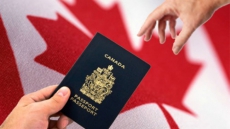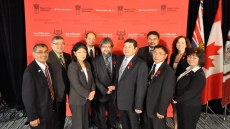OTTAWA — The Canadian Public Health Association is calling on the government to regulate the sex industry as a business with rules to protect the safety of prostitutes.
In a position paper released Friday, the association says the world's so-called oldest profession should be regulated under existing occupational health and safety regulations.
It says that would help deal with some of the root causes of prostitution, such as poverty and homelessness.
"There are indications that a public health approach based on harm reduction and addressing the social determinants of health may provide the tools needed to address the underlying factors that result in participation in the sex trade, and vulnerability to human trafficking and violence," says the report.
The report comes after Canada's controversial new prostitution law went into effect last week after the Supreme Court ruled that the old law violated the safety rights of prostitutes.
More than 60 groups across the country have called for a repeal of the law, which criminalizes the purchase of sex, along with advertising and some forms of communication.
The government's new prostitution law has ignited a sweeping debate in the country over whether the sex trade should be legalized.
The House of Commons and the Senate held public hearings on the proposed new bill this year, and heard often emotional testimony from a wide range of witnesses, more than 100 in all.
The testimony laid bare a bitter divide, often among sex workers themselves, over whether prostitutes are victims or whether they are making a free and valid career choice.
The government considers prostitution a crime against women, and has said its ultimate goal is to see it stamped out entirely.
The government also announced $20 million over five years to help prostitutes leave the trade. Friday's report called for "meaningful, appropriately resourced programs" towards exit strategies, to help prostitutes get out of the business.
Numerous witnesses, including Manitoba's attorney general, told the Commons and Senate hearings that the current level of government funding was essentially a drop in the bucket.
Ontario Premier Kathleen Wynne added her voice to the debate this week, saying she has grave concern about the new law.
The health association's new report on Friday says "the current approaches to managing sex work by criminalizing either the purchase or sale of sex do not address the root causes for entry into or the results of sex work."
The report says sex workers have a higher incidence of HIV and other sexually transmitted diseases. Researchers in Toronto, Barrie, and Oshawa found that many sex workers didn't tell health professionals how they earn a living because of a fear of discrimination "and believing that it was not relevant to their visit."
The report called for a "public health approach to sex work in Canada based on the principles of social justice, attention to human rights and equity, evidence-informed policy and practice, and addressing the underlying determinants of health."
It said such an approach would "place health promotion, health protection, population health surveillance, and the prevention of death, disease, injury and disability as the central tenet of all related initiatives."
It also pointed out — as have many — that aboriginal women are over-represented in the sex trade, and recommended special attention be paid to dealing with issues specific to them.
"The intergenerational trauma among First Nations and Inuit people resulting from residential schools has led to the destruction of social supports and family structures," the report said.
"This intergenerational trauma and the resultant poverty have been identified as a root cause for sex work and the disproportionately high number of First Nations, Inuit and Metis sex workers."





